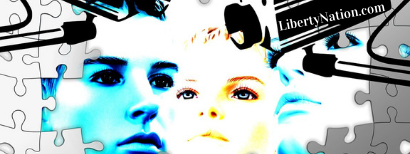As the technological realm becomes more pervasive, who can we trust? Each week, Liberty Nation brings new insight into the fraudulent use of personal data, breaches of privacy, and attempts to filter our perception.
Mueller, Conspiracy Theories and Censorship
After two years of investigation, special counsel Robert Mueller has submitted his report into Russian collusion by the 2016 Trump campaign. Despite the many unsubstantiated claims made by prominent media figures and Democrats, Mueller’s team was unable to find any conspiracy between Donald Trump and Russian agents to hijack the 2016 election.
![]() Phrases like “fake news,” “conspiracy theory” and “misinformation” have recently been tossed around with abandon, and the consequences are starting to be felt by internet users across the world. Tech providers are being accused of facilitating the spread of extremist and factually inaccurate information, and told to stamp it out. Youtube, a Google-owned company, announced in January that it would suppress recommendations of material that “could misinform users in harmful ways” such as “videos promoting a phony miracle cure for a serious illness, claiming the earth is flat, or making blatantly false claims about historic events like 9/11.”
Phrases like “fake news,” “conspiracy theory” and “misinformation” have recently been tossed around with abandon, and the consequences are starting to be felt by internet users across the world. Tech providers are being accused of facilitating the spread of extremist and factually inaccurate information, and told to stamp it out. Youtube, a Google-owned company, announced in January that it would suppress recommendations of material that “could misinform users in harmful ways” such as “videos promoting a phony miracle cure for a serious illness, claiming the earth is flat, or making blatantly false claims about historic events like 9/11.”
Facebook too is active what it deems the “fight against false news,” pushing stories deemed untrue lower on users’ news feeds. In July 2018, the site responded to mob violence incidents in Asia by saying it would start to delete inaccurate information that could provoke violent or physical harm. Tech companies including Facebook are being pushed to suppress anti-vaccine and other “conspiracy theories” and seem all too willing to comply with the pressure.
Google and Facebook have both teamed up with third-party fact-checkers to determine what content should be designated unworthy and suppressed. Ideas unsanctioned by mainstream thought are being deemed harmful – who can forget 2018’s social media blackout of famed conspiracy theorist/alternative news figure Alex Jones?
In the 2014 book, Conspiracy Theory in America, professor and author Lance deHaven-Smith claims the term “conspiracy theory” originated as a CIA invention to discredit critics of the Warren report, which described the official story surrounding John F. Kennedy’s assassination. That particular group of doubters is still among the most iconic of conspiracy theorists, though the label has developed a life of its own and become a useful tool in maligning anybody who dares to stray from the mainstream narrative. But who gets to decide what is a conspiracy theory? After all, the mainstream media has for two years perpetuated an idea that could certainly be called a conspiracy theory – all the while condemning anyone with an opposing viewpoint. And while the Mueller report appears to have debunked the Russiagate hypothesis, core believers are still unconvinced.
EU Protecting Artists or Squashing Creativity?
 The European Parliament has passed its controversial “Directive on copyright in the Digital Single Market.” According to the European Union, this legislation is designed to protect the intellectual property of artists and creators, whose content is transmitted relatively freely over social media and online forums. The EU states that “Currently, due to outdated copyright rules, online platforms and news aggregators are reaping all the rewards while artists, news publishers, and journalists see their work circulate freely, at best receiving very little remuneration for it. This makes it very difficult for artists and media professionals to earn a decent living.”
The European Parliament has passed its controversial “Directive on copyright in the Digital Single Market.” According to the European Union, this legislation is designed to protect the intellectual property of artists and creators, whose content is transmitted relatively freely over social media and online forums. The EU states that “Currently, due to outdated copyright rules, online platforms and news aggregators are reaping all the rewards while artists, news publishers, and journalists see their work circulate freely, at best receiving very little remuneration for it. This makes it very difficult for artists and media professionals to earn a decent living.”
The legislation has been widely criticized, with many wondering whether it is in fact aimed at shutting down satirical and independent voices on the internet. Article 13 of the law mandates online platforms monitor content for possible copyright infringements, while Article 11 includes a “link tax” which would charge publishers such as Google for providing excerpts of linked material. As reported by LN’s Joe Schaeffer, this could crush small online communities:
Billion-dollar tech goliaths will be able to afford the pricy filtering devices that will be needed to meet the new copyright restrictions while smaller would-be rivals will struggle mightily with the added costs to their operations. Critics also fear Big Tech will be more inclined to comply with Article 11 by paying fees to established media titans only while foregoing the content of smaller outlets, thus further quashing independent voices online … Though all this will be happening in Europe, by tilting the universal internet among such a huge population in favor of big corporations, the cherished notion of the net as a “free-for-all” buffet of information will be greatly reduced.
The law will not hold individual internet users responsible for copyrighted material posted online, but will rather target host sites like Youtube, Facebook and Google, forcing them to police and filter every uploaded item. The EU denies that the law seeks to censor internet “memes” or satirical content, but, some have pointed out that technological filters have no way of distinguishing parody from genuine plagiarism.
Casey Newton of The Verge commented that the very structure of the internet may be changing before our eyes:
Reading today’s news about the European Union’s passage of the Copyright Directive, though, I wondered whether we would all soon need passports as we travel around the web. The internet had previously been divided into two: the open web, which most of the world could access; and the authoritarian web of countries like China, which is parceled out stingily and heavily monitored. As of today, though, the web no longer feels truly worldwide. Instead we now have the American internet, the authoritarian internet, and the European internet … If it goes far enough, the entire internet may begin to feel like Netflix, whose library of content varies dramatically depending on which country you log on from.
Finally, here is a golden nugget found in the EU directive’s official frequently asked questions: “Freedom on the internet, as in the real world, will continue to exist as long as the exercise of this freedom does not restrict the rights of others, or is illegal.”
Freedom will continue to exist, unless it breaks the law – who gets to decide these laws, again?
Recommendations
While subversive or merely “different” ideas may be pushed into the background of the internet, providers and regulators cannot yet be seen to outright ban free speech. LN readers are surely not afraid to pursue their own interests and explore unconventional ideas. It may just require a little more work to find such information over the upcoming months and years, but that’s no reason to give up and stop questioning the stories fed to us.
That’s all for this week’s edition of You’re Never Alone. Check back in next Monday to find out what’s happening in the digital realm and how it impacts you.




